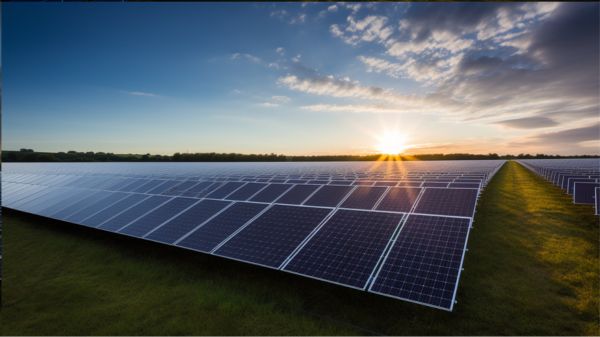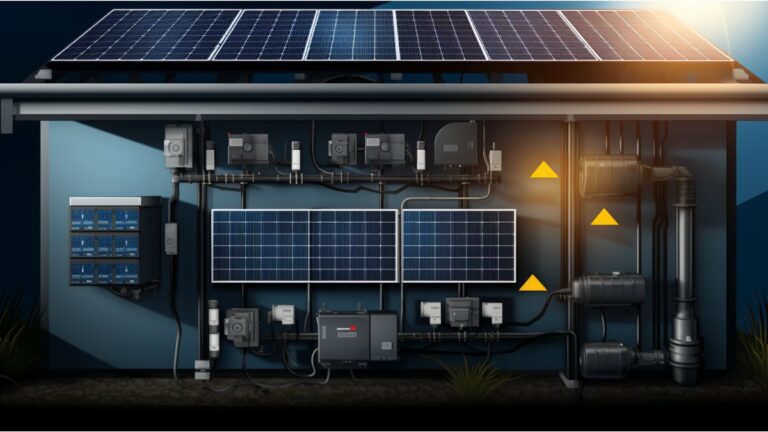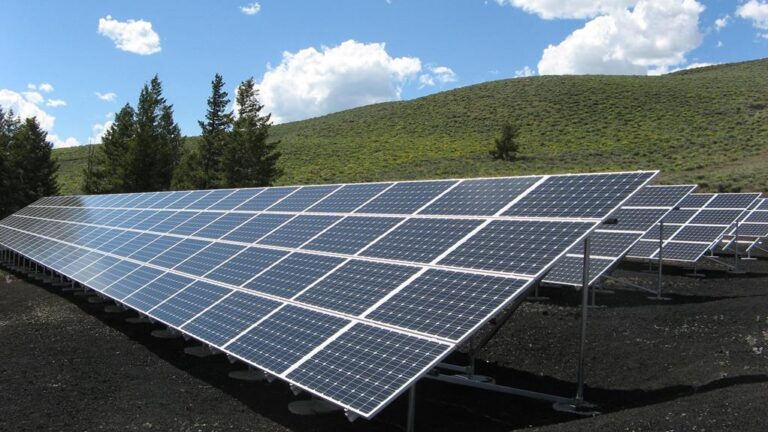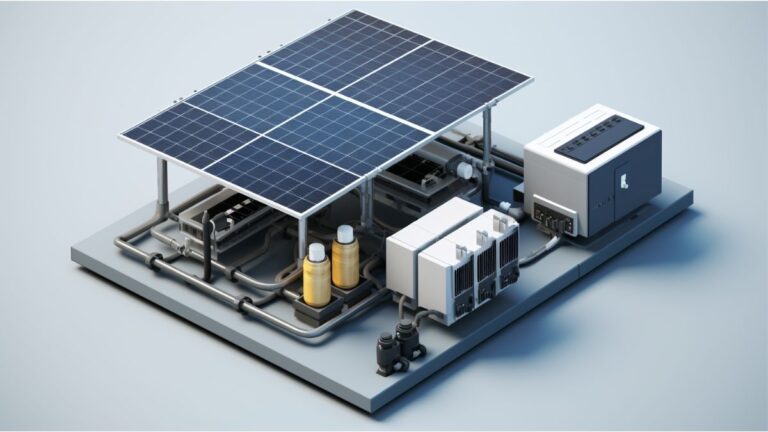The Potential of Solar Energy: A Closer Look at Solar Panels
Hey there! Did you know the potential of solar energy and how it is revolutionizing the way we power our world? In this article, we’ll take a closer look at solar panels and explore their incredible potential.
We’ll dive into the process of how solar panels convert sunlight into electricity and examine different types of solar panel systems. Get ready to unleash the potential of solar energy and discover how it’s changing the game.
Let’s get started!
The Process of Solar Panels
Let’s delve into how solar panels harness the power of the sun.
Solar panel efficiency has come a long way due to advancements in solar technology. When sunlight, carrying tiny particles of energy called photons, hits the solar panel, it causes electrons to flow in the solar cells.
These flowing electrons then travel through wiring to an inverter, which transforms the direct current (DC) electricity into alternating current (AC) electricity. This AC electricity can then be used to power homes, businesses, and more.
It’s amazing how these panels convert sunlight into usable energy! With ongoing advancements, solar panel efficiency continues to improve, making solar power an increasingly viable and sustainable option.
Solar Panel System Types
Now, let’s explore the different types of solar panel systems available for harnessing solar energy. When choosing a solar panel system, there are several factors to consider. Here are the pros and cons of each type:
On-Grid Systems:
- Pros: These systems are connected to the public grid, allowing you to export excess electricity and earn credits. They’re commonly used by homes and businesses.
- Cons: On-grid systems can’t generate electricity during power outages, as feeding electricity into a damaged grid can be unsafe.
Off-Grid Systems:
- Pros: These systems provide energy independence and are suitable for remote areas. They rely on battery storage for operation.
- Cons: Off-grid systems require appropriate design and sufficient battery capacity. However, decreasing battery prices are making them more common.
Hybrid Systems:
- Pros: Hybrid systems combine the benefits of on-grid and off-grid systems. They can store solar energy generated during the day and utilize the grid as a backup.
- Cons: Hybrid systems require both grid-tied solar and battery storage, which may increase the initial cost. However, decreasing battery costs make them more attractive.
Consider your energy needs, location, and budget when choosing a solar panel system.
On-Grid Solar Systems
Continuing from the previous subtopic, our exploration of solar panel system types takes us to on-grid solar systems.
On-grid systems, commonly used by homes and businesses, have the advantage of being connected to the public grid, eliminating the need for batteries. Excess electricity generated by these systems can be exported back to the grid, resulting in credits for the owner.
However, there’s a drawback. On-grid systems can’t generate electricity during power outages. Feeding electricity into a damaged grid during an outage can be unsafe.
So, while on-grid systems offer convenience and potential cost savings, they do have limitations in terms of reliability during emergencies. It’s important to weigh these advantages and drawbacks before deciding on the type of solar system that best suits your needs.
Off-Grid Solar Systems
Moving on to off-grid solar systems, we explore an alternative solution for generating and storing solar energy. Here are three key aspects to consider:
Advantages of off-grid systems:
- Independence: Off-grid systems allow you to be self-sufficient, unaffected by power outages or grid failures. No more relying on the whims of utility companies!
- Environmental Impact: By going off-grid, you reduce your carbon footprint and contribute to a cleaner, greener planet.
- Cost Savings: With no monthly electricity bills, you can save a significant amount of money in the long run.
Challenges of off-grid systems:
- Initial Investment: Setting up an off-grid system can be costly, requiring solar panels, batteries, and inverters. However, decreasing prices are making it more accessible.
- Battery Maintenance: Proper maintenance and monitoring of batteries are crucial to ensure optimal performance and longevity.
- Energy Management: Planning and managing your energy consumption becomes essential, as you need to balance supply and demand efficiently.
Off-grid solar systems offer numerous advantages, but they also come with their fair share of challenges. However, the benefits of energy independence, environmental impact, and cost savings make it a compelling option for those willing to embrace the off-grid lifestyle.
Hybrid Systems
As we delve further into the realm of solar energy systems, let’s explore the fascinating world of hybrid systems that combine the benefits of on-grid and off-grid capabilities.
Hybrid systems are a clever solution that harnesses the advantages of both on-grid and off-grid solar systems. One of the key advantages of hybrid systems is their ability to store solar energy generated during the day. This stored energy can be used during the night or during power outages when the grid is unavailable.
The installation process for hybrid systems involves the integration of grid-tied solar panels and battery storage. This allows for a seamless transition between the grid and battery backup, ensuring a continuous and reliable power supply.
With decreasing battery costs, hybrid systems are becoming increasingly attractive for homes and businesses looking to maximize the benefits of solar energy.
Benefits of On-Grid Systems
Now let’s delve into the advantages of on-grid systems, starting with how they enhance the reliability of our solar energy supply.
- Consistent Power Supply: On-grid systems ensure a reliable power supply as they’re connected to the public grid. This means that even if your solar panels don’t generate enough electricity, you can still draw power from the grid.
- Cost Savings: On-grid systems eliminate the need for expensive battery storage. This significantly reduces the overall cost of the solar panel system. You can save money by not having to invest in batteries and their maintenance.
- Environmental Impact: On-grid systems allow you to export excess electricity back to the grid. This reduces the strain on the public grid and promotes the use of clean energy. By contributing to the grid, you’re actively participating in the transition to a more sustainable and eco-friendly energy system.
Advantages of Off-Grid Systems
Off-grid systems offer self-sufficiency and independence in harnessing solar energy. One of the main advantages of off-grid systems is their ability to maximize solar energy storage capabilities.
Unlike on-grid systems that rely on the public grid, off-grid systems use battery storage to store excess solar energy for later use. This allows users to have a constant and reliable power supply, even during power outages or in remote areas where grid connection isn’t possible.
Additionally, off-grid systems provide the freedom to choose the size and capacity of the battery storage, allowing users to customize their energy usage according to their needs. By maximizing solar energy storage capabilities, off-grid systems offer a sustainable and reliable solution for those seeking energy independence.
Hybrid Systems: Best of Both Worlds
Combining the benefits of on-grid and off-grid systems, hybrid systems offer a versatile solution for maximizing solar energy usage. With battery technology advancements and optimizing energy storage, hybrid systems provide the best of both worlds. Here’s why they’re gaining popularity:
- Constant power supply: Hybrid systems can store excess solar energy generated during the day and use it during the night or during power outages. Say goodbye to those dark nights!
- Energy independence: By utilizing both grid-tied solar and battery storage, hybrid systems offer the flexibility to generate and store your own energy. Don’t be at the mercy of the grid!
- Cost-effective: Decreasing battery costs make hybrid systems more attractive. You can save money by using stored energy during peak hours when electricity prices are high. It’s like having your own personal energy piggy bank!
With hybrid systems, you can harness the power of the sun while enjoying the reliability of the grid. It’s truly the best of both worlds!
Considerations for Choosing a Solar Panel System
After exploring the benefits of hybrid systems, let’s now delve into the important considerations for choosing a solar panel system.
When selecting a solar panel system, there are several factors to consider, with cost effectiveness being one of the most crucial. It’s essential to evaluate the upfront cost of the system and compare it to the long-term savings on electricity bills.
Additionally, the efficiency of the solar panels should be taken into account. Higher efficiency panels produce more electricity, resulting in greater cost savings over time.
Other factors to consider include the durability and warranty of the panels, as well as the installation process and maintenance requirements.
Future Trends in Solar Panel Technology
As we continue exploring the advancements in solar panel technology, it’s important to consider the future trends that will shape the efficiency and effectiveness of these systems. Here are three exciting developments to look forward to:
Solar panel efficiency improvements
Scientists and engineers are constantly working to increase the efficiency of solar panels. This includes developing new materials and technologies that can capture more sunlight and convert it into electricity. By improving efficiency, solar panels can generate more power with the same amount of sunlight, making them even more cost-effective.
Innovative solar panel designs
From transparent solar cells to solar panels that can be seamlessly integrated into building materials, there are exciting innovations happening in the field of solar panel design. These new designs not only enhance the aesthetics of solar installations but also expand the potential applications for solar power.
Smart solar panel technology
The future of solar panels lies in their ability to communicate and optimize their performance. Smart solar panels can adjust their tilt and orientation to maximize sunlight absorption, detect and mitigate shading issues, and even self-clean to maintain optimal efficiency. These advancements will make solar panels more intelligent and efficient, further driving the adoption of solar energy.
With these future trends in solar panel technology, we can look forward to even more efficient and innovative ways of harnessing the power of the sun. Exciting times are ahead for solar energy!
Conclusion
As we conclude our exploration of solar panels and their potential, we find ourselves captivated by the immense power and beauty of the sun. Through the intricate process of converting sunlight into usable electricity, solar panels offer us a sustainable and clean alternative to traditional energy sources.
With on-grid, off-grid, and hybrid systems, we have the flexibility to meet our energy needs in various ways. As we embrace the future of solar panel technology, we are witnessing a revolution in how we power our world, paving the way for a brighter and greener future.






